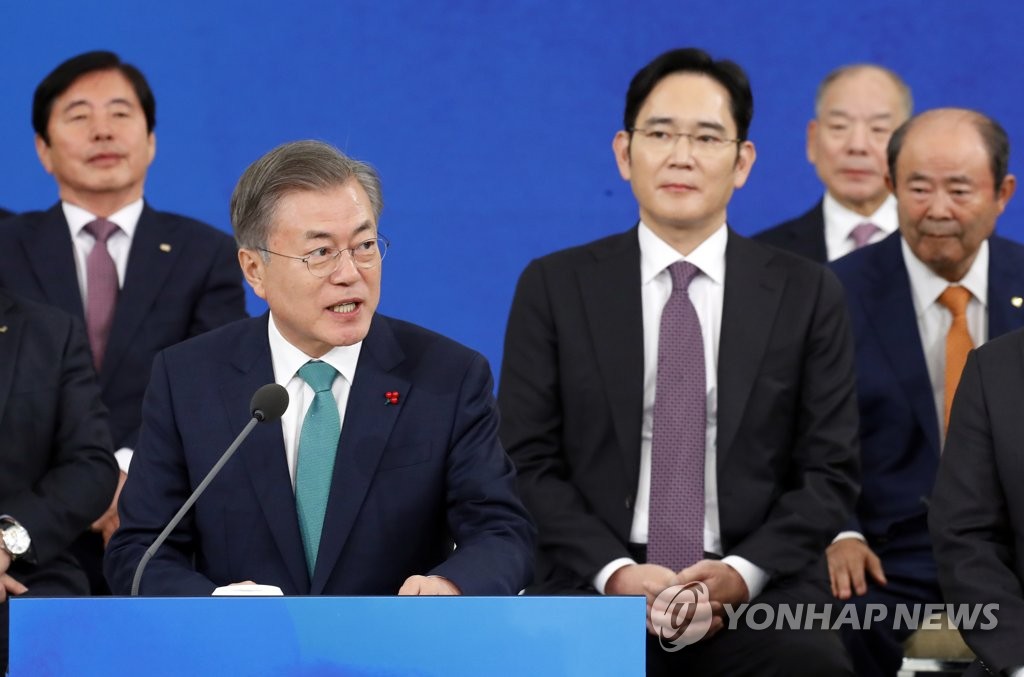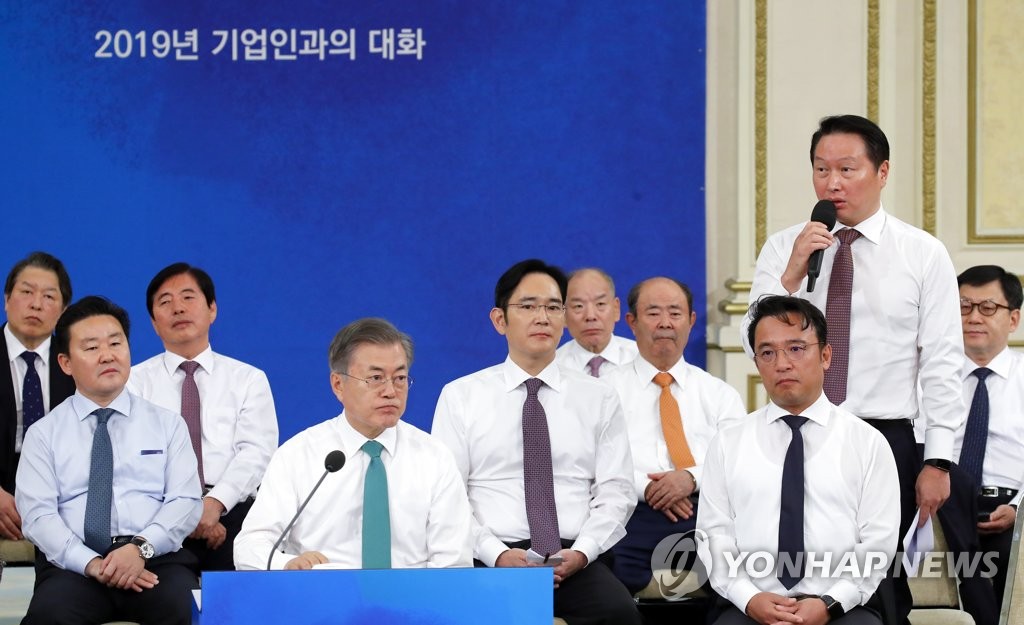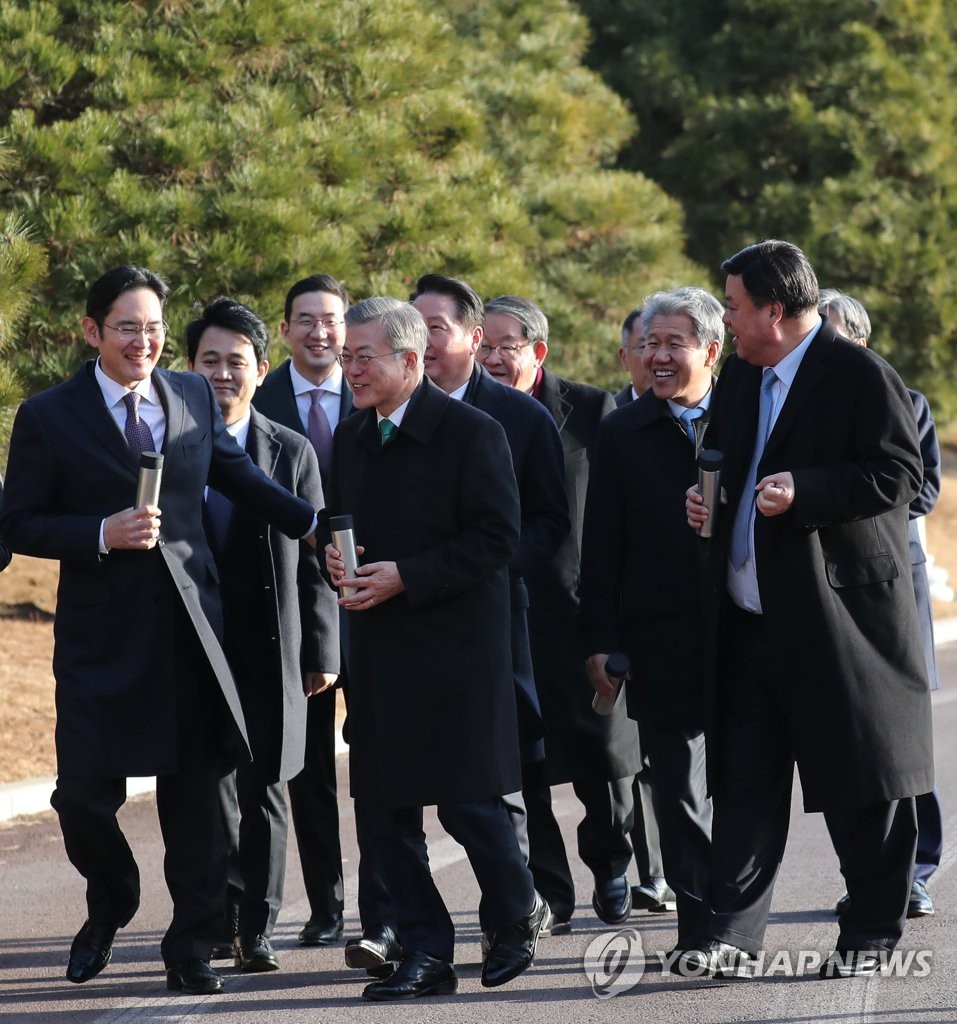- California Assembly OKs highest minimum wage in nation
- S. Korea unveils first graphic cigarette warnings
- US joins with South Korea, Japan in bid to deter North Korea
- LPGA golfer Chun In-gee finally back in action
- S. Korea won’t be top seed in final World Cup qualification round
- US men’s soccer misses 2nd straight Olympics
- US back on track in qualifying with 4-0 win over Guatemala
- High-intensity workout injuries spawn cottage industry
- CDC expands range of Zika mosquitoes into parts of Northeast
- Who knew? ‘The Walking Dead’ is helping families connect
President calls on large firms to create more jobs, increase investment
President Moon Jae-in asked the country’s top conglomerates and large firms to increase their local investment and create more jobs Tuesday, amid growing concerns of a possible slowdown that many believe may have been partly caused by his policy of boosting household income.
The call came in a special meeting held at the presidential office Cheong Wa Dae, attended by the top executive officers and representatives of about 130 local companies.
“Employment and investment are the foundation for the growth of a company and its efforts to secure a future growth engine, while at the same time they are a way to contribute to the national economy and the people’s livelihood,” the president told the meeting, according to Cheong Wa Dae pool reports.



President Moon Jae-in (front row, L) speaks in a meeting with top business leaders held at his office Cheong Wa Dae in Seoul on Jan. 15, 2019. (Yonhap)
Tuesday’s meeting follows a similar session last week, also held at Cheong Wa Dae, with the leaders of small and medium-sized enterprises, in which Moon promised increased support for smaller firms.
The president noted the large firms were better able to offer the kind of quality jobs preferred by job seekers.
“Companies with more than 300 (employees) have the jobs most preferred by the youth. The top 30 groups have steadily increased their employment over the past five years while companies with more than 300 employees accounted for nearly half of new jobs last year by increasing their employment by about 50,000,” Moon was quoted as saying.
In 2018, the country added about 95,000 new jobs, the smallest gain since 2009, while its unemployment rate reached a 17-year high of 3.8 percent.
Many local companies have blamed the recent increases in the wage for the apparent dip in the local job market.
Moon earlier vowed to increase the country’s minimum hourly pay rate to 10,000 won (US$8.90) by 2020, though he has hinted at a possible delay amid worsening economic conditions.
Still, the minimum wage has jumped by nearly 30 percent to 8,350 won per hour this year from 6,470 won in 2017 when Moon came into office.
“Creating good jobs is the most urgent issue facing our economy. You have done well so far, but I ask you once again to spearhead efforts to create new jobs, paying special attention to the issue,” the president was quoted as saying.
Moon’s latest meeting with business leaders involved the top executive officers of the country’s 22 largest companies, including vice chairman Lee Jae-yong of Samsung Electronics Co., who was also asked by Prime Minister Lee Nak-yon to help create more jobs during a rare prime ministerial visit to Samsung headquarters last week.
President Moon also asked the businesses to increase their investment, noting their facility investment has been on the decline since the second quarter of last year.
“Creating an environment where companies can leap (forward) is our government’s goal this year,” he said.
“Especially, I sincerely hope to see more investment in new industrial sectors, new technologies and new products for the development of future growth engines.”
The president vowed increased support.
“The government too will actively support your efforts to innovate. It will actively help develop new technologies, human resources and commercialize advanced technologies with its research and development budget that will top 20 trillion won this year,” he said.
Moon also promised stepped-up efforts to remove unnecessary or excessive regulations.
“There are many forecasts that our economy, along with a slowing global economy, will face difficulties this year. But I believe we can surely overcome any difficulty and revitalize our economy if the government, companies and labor combine their strength,” he said.
Moon’s opening remarks were quickly followed by a discussion session where the business leaders were given a chance to freely ask questions or make suggestions, Cheong Wa Dae said.
Lee, the vice chairman of Samsung Electronics, vowed to expand the company’s investment in technology and infrastructure.
Hyundai Motor Group vice chairman Chung Eui-sun said the business group will focus on developing electric and hydrogen-powered vehicles, and Hwang Chang-gyu, the CEO of South Korea’s top fixed-line operator, KT Corp., called for deregulation in areas related to privacy protection.
The presidential office earlier said the government plans to publish a book with all the questions and suggestions presented at Tuesday’s meeting, along with responses from related government offices.
After the indoor session, Moon had a stroll around the presidential compound with leaders of major business groups, during which he told Hyundai Group Chairwoman Hyun Jeong-eun that things will “work out well,” apparently referring to the company’s inter-Korean projects.
Hyundai Group is a key operator of the now-suspended tour program to Mount Kumgang on North Korea’s east coast, as well as a developer of the Koreas’ now-shuttered joint industrial park in the North’s border town of Kaesong.
Before the end of the walk, Moon again told Hyun that he will “speed up.” Asked whether the comments were about specific projects, Cheong Wa Dae spokesman Kim Eui-kyeom said Moon seemed to have meant the remarks “comprehensively.”











